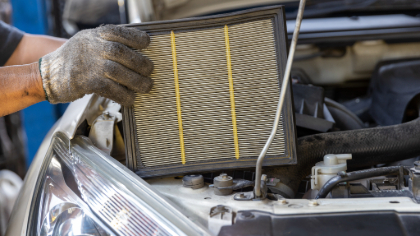INDEPENDENT DEALER
Clermont, FL | (918) 269-0081
OUR BLOG
Want better performance? Don’t neglect car filter maintenance! K&K Oilsandlube in Clermont, FL, explains the role of oil, air, fuel, and transmission filters in keeping your vehicle in top shape.

Your car’s filters may not make much noise, but they do a big job behind the scenes. They keep out dirt, dust, and other gunk that can damage your engine, transmission, fuel system, and even the air inside your cabin. When these filters are clean and working properly, your car runs smoother, lasts longer, and stays out of the repair shop.
So, what are these devices, and why is car filter maintenance so important? Let’s explore the four main types and see how each one helps protect your car’s performance and longevity.
Looking for superior engine protection? K&K Oilsandlube in Clermont, FL, has you covered with the best AMSOIL products! Dial (918) 269-0081 for expert help. Don’t forget to explore AMSOIL’s online store to stock up on must-have car care items.
1. Oil Filter: Protecting Your Engine’s Lifeblood
What It Does
The oil filter keeps your engine safe by trapping dirt, metal flakes, and sludge in the oil. It helps everything run smoothly and prevents early wear under the hood. No filter means accelerated mechanical wear.
Symptoms of a Clogged Oil Filter
If your oil pressure drops, the oil looks dirty, or your engine starts overheating, the filter might be struggling. A lit oil warning light is another red flag. Ignoring these signs can lead to serious engine damage.
Maintenance Tips
Replace the oil filter with every oil change (if you're using AMSOIL, that’s about every 25,000 miles). Always opt for high-quality filters; they trap more contaminants and last longer.
2. Transmission Filter: Keeping Your Gear Shifts Smooth
What It Does
The transmission filter keeps fluid clean by catching metal particles and debris. A healthy filter ensures smooth gear shifts and helps your transmission last longer.
Symptoms of a Dirty or Failing Transmission Filter
If your car hesitates when shifting, slips between gears, or makes grinding noises, the filter might be clogged. Dark or burnt-smelling transmission fluid is another warning sign.
Maintenance Tips
Replace the transmission fluid and filter together, just like your car's manufacturer recommends. Skipping or delaying this service can lead to serious (and pricey) transmission trouble.
3. Fuel Filter: Delivering Clean Fuel for Peak Performance
What It Does
Your fuel filter protects your engine by blocking dirt and debris. The result? Smoother combustion, stronger power, and better fuel economy.
Symptoms of a Clogged Fuel Filter
Struggling to start the engine? Losing power when accelerating uphill? Misfires or stalling? A clogged fuel filter could be the culprit. Poor gas mileage is another telltale sign.
Maintenance Tips
Replace it every 20,000 to 40,000 miles, or sooner if you drive an older car. Using high-quality fuel reduces contamination and extends the filter’s life.
Don’t settle for less! Treat your engine to advanced formulas, like AMSOIL Signature Series 5W-50 100% Synthetic Motor Oil. Call K&K Oilsandlube in Clermont, FL, at (918) 269-0081 today, or explore AMSOIL’s online shop for reliable fluids and filters.
4. Engine Air Filter: Clean Air for Combustion
What It Does
The engine air filter prevents dust, dirt, and debris from entering your engine’s air intake. It helps maintain the proper air-fuel mixture, ensuring your engine runs efficiently.
Symptoms of a Dirty Engine Air Filter
Sluggish acceleration, black exhaust smoke, or a check engine light may indicate a clogged air filter. A severely dirty filter can even cause engine misfires.
Maintenance Tips
Check your engine air filter every 12,000 to 15,000 miles, or more often if you drive in dusty areas. If it’s clogged, replace it. A fresh filter keeps your engine running strong and helps improve fuel efficiency.
5. Cabin Air Filter: Clean Air Inside the Vehicle
What It Does
This filter keeps dust, pollen, and pollution out of your cabin. It’s essential for clean air and a well-functioning HVAC system.
Symptoms of a Clogged Cabin Filter
Weak airflow from vents, musty smells, or foggy windows? Your cabin filter may need replacing. Allergy sufferers will notice the difference immediately.
Maintenance Tips
Swap it out every 15,000 to 30,000 miles. If you drive in polluted or high-pollen areas, change it more frequently.
Final Thoughts: Don’t Ignore the Filters!
Filter maintenance is simple but essential. Stick to your maintenance schedule, use high-quality replacements, and stay ahead of problems. A little attention today means a smoother, cleaner, and more efficient ride tomorrow.
Ready to check your filters? Grab your owner’s manual or consult a trusted mechanic; your car will thank you!